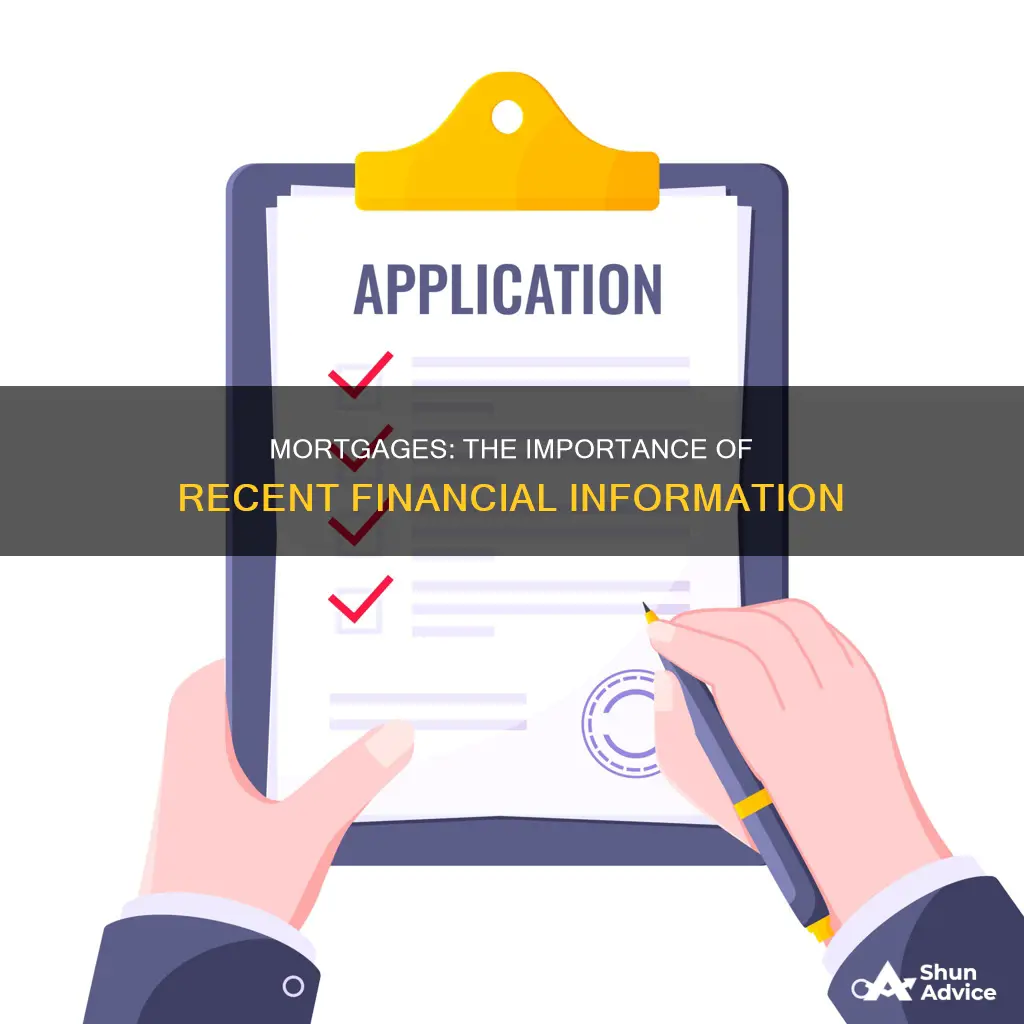
When applying for a mortgage, lenders will ask for financial information to assess your ability to make payments and manage your money responsibly. They will typically request two months' worth of bank statements, pay stubs, W-2 forms, and tax returns. Lenders want to verify your income, savings, and overall financial health to ensure you can afford the down payment and future mortgage payments. They will also review your credit score and history, looking for red flags such as a high credit utilization ratio or recent negative marks. Providing comprehensive and up-to-date financial information is crucial to securing favourable loan terms and ensuring a smooth mortgage application process.
| Characteristics | Values |
|---|---|
| Bank statements | Lenders typically seek two months of recent bank statements. They may ask for three months of statements or 12-24 months if you are self-employed. |
| Credit score | The minimum credit score required depends on the type of mortgage and lender. For a conventional loan, the score is usually 620, and for an FHA loan, it is 500. |
| Credit report | Lenders review your credit report for negative marks, such as bankruptcy, charge-offs, delinquencies, collections, or accounts settled for less than the amount owed. |
| Credit utilization | Lenders consider your credit utilization ratio, which indicates how much of your available credit you are using. Utilization rates over 30% can be a warning sign. |
| Income | Lenders prefer borrowers with a steady, predictable income. They will verify your income and employment through tax returns, pay stubs, and by contacting employers. |
| Savings | Lenders want to know if you have the savings to cover the down payment and closing costs. They will also consider your overall financial health and ability to weather unexpected expenses. |
| Debt-to-income ratio | Lenders consider your debt-to-income ratio, which should ideally be below 43%. |
What You'll Learn
- Lenders need to verify your financial health and credibility
- You need to provide bank statements for accounts holding funds for the loan
- Lenders will check for red flags in your bank statements
- Lenders will re-check some aspects of your financial situation before closing
- Lenders will want to see your tax returns and pay stubs

Lenders need to verify your financial health and credibility
Lenders will also want to see your spending habits and recurring expenses to gauge your ability to manage money responsibly. This includes looking for consistent bill payments, existing debts, and overall financial commitments. They will also check your debt-to-income ratio (DTI), which evaluates an individual’s ability to manage monthly debt payments. A low DTI ratio means the borrower is managing the debt payoffs well, while a high DTI ratio indicates that the individual may have trouble paying off debts in the future. Lenders will also want to see that you have savings and financial reserves, which indicates financial health and shows that you can handle unexpected expenses and continue with monthly mortgage payments even during emergencies.
Lenders will also be on the lookout for red flags such as multiple overdrafts or non-sufficient funds (NSF) charges, which could cause them to question whether you can afford a mortgage. Large deposits that aren't from payroll or another disclosed source can also be a red flag, as they could signal that you've received gift funds or borrowed money to inflate your balances. Lenders will also want to avoid fraudulent activity, such as funds from undisclosed gifts meant to pad your accounts.
Maximizing Your Mortgage: $20,000 Down Payment, How Much Can You Borrow?
You may want to see also

You need to provide bank statements for accounts holding funds for the loan
When applying for a mortgage, lenders will ask for your bank statements to verify that you can afford the down payment, closing costs, and future mortgage payments. They will also use your bank statements to assess your financial health and credibility. Typically, lenders will seek two months' worth of recent bank statements during the home loan application process. This is because any credit or deposit accounts older than two months should have appeared on your credit report.
You need to provide bank statements for any accounts holding funds you'll use to qualify for the loan, including money market, checking, and savings accounts. This is to ensure that the money has been in your account for at least 60 days. The funds should show up on the two months' bank statements you're required to provide. If you are self-employed, you will need to provide 12-24 months of bank statements.
Lenders will look at any direct debits, financial commitments, or regular spending habits from month to month in your bank statements to help calculate whether your mortgage is affordable. They will also check for red flags such as multiple overdrafts or non-sufficient funds (NSF) charges, which may indicate financial mismanagement. It's important to review your bank statements with a critical eye before submitting them to your mortgage company, as you may need to provide explanations for any red flags that are found.
Why Mortgages Aren't Current Liabilities for Businesses
You may want to see also

Lenders will check for red flags in your bank statements
Lenders will scrutinise your bank statements for red flags, which, if found, may require lengthy explanations. They will be looking for signs of unacceptable sources of funds, undisclosed debts, and financial mismanagement.
Large deposits are a common red flag for lenders. A "large" deposit is usually defined as any out-of-the-norm amount that gets credited to your savings or checking accounts. A single deposit that exceeds 50% of your total monthly qualifying income for the loan will be flagged. Lenders will want to confirm that you did not take out a new loan and that the money came from acceptable sources. For example, the deposit should not come from a party that may benefit from the transaction, like a real estate agent or the home seller. You must declare all your income streams when applying for a loan, so unusual deposits may indicate that you have undocumented sources of income or side gigs.
Mortgage lenders will also be wary of frequent overdrafts or non-sufficient funds (NSF) charges, which may lead them to conclude that you are not managing your finances well. Other red flags include undisclosed liabilities, irregular transactions, excessive debt payments, and inconsistent income deposits.
Lenders will also take into account major life events, like starting a family, going on maternity leave, or getting a divorce, at the time of your loan application. They may become wary of your financial capacity and require additional proof that you can make monthly payments without hiccups.
Balloon Mortgages: Are They Common or Uncommon?
You may want to see also

Lenders will re-check some aspects of your financial situation before closing
Lenders will perform a thorough check of your financial situation before approving your mortgage application. They will typically seek two months' worth of recent bank statements during the home loan application process. They will also look at your credit score, existing debts, and any sources of income you'll use to qualify for the loan. These factors help determine how much house you can afford, the loan amount, and the interest rate.
Lenders will also re-check some aspects of your financial situation before closing. They will want to ensure that nothing significant has changed since the initial approval. This includes verifying that you can afford the down payment, closing costs, and future mortgage payments. They will also look for any new debts that may have been incurred, as this can affect your credit score and debt-to-income ratio (DTI), potentially impacting your loan approval and interest rate.
It is important to avoid making any major changes to your finances during the mortgage process. This includes financing any large purchases, such as a new car or boat, or opening new lines of credit, such as a credit card. These transactions can lower your credit score and impact the interest rate and loan amount you receive.
Additionally, if anything changes with your income or employment prior to closing, it is essential to inform your mortgage lender immediately. They can then assess whether these changes will impact your loan approval and help you understand how to proceed.
Overall, maintaining a stable and predictable income, avoiding new debts, and keeping your lender informed of any significant financial changes are key to ensuring a smooth mortgage approval process and closing.
The Mortgage Bond Market Crash of 2008: A Postmortem
You may want to see also

Lenders will want to see your tax returns and pay stubs
Lenders will also look at your bank statements to verify that you can afford the down payment, closing costs, and future mortgage payments. They will typically seek two months of recent bank statements during the home loan application process. They will also use bank statements to assess your financial health and credibility when considering a loan application.
Mortgage lenders carefully review applications using a range of criteria, including credit, income, savings, and your down payment. They will also check your credit report and credit score. Your credit utilization ratio indicates how much of your available revolving credit you're using at a given time, primarily on credit cards. Utilization rates over 30% can be a warning sign to lenders and can also damage your credit scores. Lenders will also check if you've recently applied for other forms of credit or debt, which put hard inquiries on your report; too many in a short time could reveal possible financial trouble.
If you are self-employed, a business owner, or earn income through other sources (such as rental income or significant interest income), you’re more likely to be asked for your tax returns. Lenders will want to see your business's gross income versus net income. By utilizing personal and business tax returns, lenders can understand how much net profit is available when determining the self-employed borrower’s earnings potential.
Prepaying Your Mortgage: How Common Is It?
You may want to see also
Frequently asked questions
Lenders will typically ask for two months' worth of recent financial information, including bank statements and pay stubs. They may also ask for one to two years' worth of tax returns.
Lenders want to know that you can afford the down payment, closing costs, and future mortgage payments. They will also be looking for any red flags, such as multiple overdrafts or non-sufficient funds charges.
You will need to provide proof of identity, and information about the property and loan you are interested in. Lenders will also want to know about your credit history and your debt-to-income ratio.
Yes, you should inform your lender immediately if anything changes with your income or employment prior to closing. Lenders will also re-check some aspects of your financial situation before closing to ensure nothing significant has changed.







